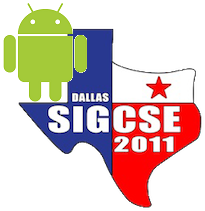
Audacious Android Application Programming Workshop
What: Workshop 11
at SIGCSE 2011 in Dallas, Texas
When: Wednesday, March 9, 2011, from 7:00 pm - 10:00 pm
Where: Sheraton Dallas Hotel in the Lone Star A4 room
Workshop Leader: Frank McCown, Assistant Professor of Comp Sci at Harding University
Summary
As smartphones and mobile devices become ubiquitous, many CS departments are adding mobile computing electives to their curriculum. Google’s Android OS is a freely available and popular smartphone platform with applications programmed in Java.
In this three hour workshop, participants will be introduced to mobile app development and the Android SDK. We will write some simple Android apps with Eclipse and run them on an emulator. For those interested in teaching an upper-level Android course, reusable programming labs and projects will be distributed, and we will discuss some teaching strategies.
Participants should be capable of writing Java programs in Eclipse and should bring their own laptop preloaded with Eclipse and the Android SDK. Instructions on installing the necessary software is discussed in the next section.
Prerequisites
Before you arrive for the workshop, I advise you to have the proper software installed on your laptop. There will not be enough time during the workshop to install this software as it can take up to 30 minutes to download and install. Windows, Max OS X, and Linux are all supported.
The best way to develop applications for Android is using the Eclipse IDE and the Android plug-in for Eclipse called Android Development Tools (ADT). The plug-in allows you to run your applications on an Android Virtual Device (AVD), aka Android emulator.
To setup your environment, complete each of the steps below which are given in detailed instructions on the Android Developer website.
- Download and install JDK 6. The Standard Edition version is fine.
- Download and install Eclipse IDE for Java EE Developers, either version 3.5 (Galileo) or 3.6 (Helios).
- Download the Android SDK and unzip it onto your hard drive in a location of your choosing. If you are running Windows, you can run the "Recommended" Windows installer.
- Download and install the Android Development Tools (ADT) for Eclipse.
- Using the Android SDK and AVD Manager, add the SDK Platform Android 2.2, API 8 package. It's fine if you would like to use another SDK version, but I will be using 2.2 during the tutorial.
Handouts
Other Resources
iPhone vs. Android- Smart Smartphone Development: iOS versus Android by Goadrich and Rogers, SIGCSE 2011
- Android vs iPhone Development: A Comparison by David Green (2009)
- Android SDK from an iPhone Developer's Perspective by Jeff Lamarche (2010)
Android Books
- Hello, Android: Introducing Google's Mobile Development Platform by Burnette (2010)
- Android in Action by Ableson & Sen (2011)
- Beginning Android 2 by Mark Murphy (2010)
- Pro Android 2 by Hashimi, Komatineni, & MacLean (2010)
- Android Wireless Application Development by Conder & Darcey (2010)
Android Courses
- Google Code University - Android
- Android App Course at California Polytechnic State University
- Mobile Application Development (Android) at Olin College
- Mobile Computing with iPhone and Android at Columbia University
| Home | Page last modified: |